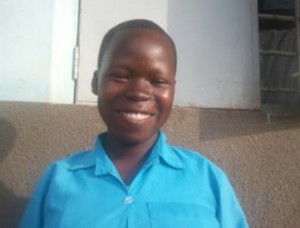Meet Susan Piloya #GirlsEducation
February 5, 2015We would like to introduce you to Susan Piloya, a 14 year old student in Class P6 at Koch Goma Primary School – one of the highest population schools in the region, with over 1,000 pupils.
Water, sanitation and hygiene (WASH) is recognised as a crucial component affecting the quality of girls’ education in developing countries. Without access to facilities including hygienic latrines and changing rooms, girls are at serious risk of illness, school dropout and sexual abuse. This often puts them at a significant disadvantage to their male counterparts, hindering boys’ and girls’ equitable access to education.
If girls are to be encouraged to stay in school they need clean, private facilities in which to feel safe and secure. Too often in countries like Uganda there is either a complete lack of such facilities in schools, or girls are forced to use changing rooms and washrooms which are dirty or have no doors, leaving them exposed and potentially unsafe. Thanks to large programmes in the mid-90s like UNICEF’s Water, Education and Sanitation programme, which ran from 1995 – 2000, there has been an increase in the prevalence of such facilities for girls, but there is still a long way to go.
Girls’ access to changing rooms and washrooms is of particular importance during menstruation; it is all-too-common for girls to feel they have to skip school in order to manage their periods. Without clean and private changing rooms and washrooms they have nowhere to change dirty pads and manage their personal hygiene. Providing girls’ changing rooms and washrooms enables them to manage their menstruation with dignity, encouraging them to stay in school throughout their periods, and ultimately to stay in school full stop.
After attending one of our workshops for girls, Susan told us:
“Before the girls’ workshop, I would always feel uncomfortable going to the toilet to change my pads. Now I know it is normal and I’m healthy. I learnt how to take care of myself during menstruation and this has allowed me to stay freely in school throughout my period”.
“After the training I have been telling other girls how to avoid early pregnancy. I have been telling them about using condoms or abstaining from sex so that they can continue with their studies uninterrupted by pregnancy.”
Because many pupils lack the opportunity to become more aware of changes in their bodies when they grow up, girls often become the target of bullying and ridicule from boys at school. We have found that, unfortunately, many girls suffer these experiences in silence and are put off going to school as a result.With greater information, we hope to change this outlook for many girls in the region.
Since the start of the project, we have found strong support, both from teachers and from the local community, for girls’ education. This support has been so strong that the school community itself came up with the idea of forming after-school clusters. This allows a senior mother figure to mentor and support girls experiencing challenges, and is proving to be an effective way of encouraging girls to stay in school.
We are looking to build on the success of this programme both in northern Uganda and with the community schools we work with in Kalomo District, Zambia. Read more about the programme here.
Set up a monthly donation here.

